BusinessEurope Headlines No. 2017-40
Completing EMU - letter to President Juncker and meeting with VP Dombrovskis
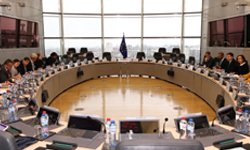 Ahead of the European Commission’s package of proposals to strengthen the Economic and Monetary Union (EMU) expected for 6 December 2017, BusinessEurope President Emma Marcegaglia has written to Commission President Jean-Claude Juncker stressing the importance of progress in this area. The letter notes that completing the EMU and strengthening trust in the Euro is a priority for business, and goes on to argue that the Commission must set out a full road map outlining the measures it believes necessary to strengthen the EMU, with a clear and specific timetable for action. The letter also emphasizes the need to reinforce the European Semester in order to support convergence, to improve the efficiency of the fiscal rules, and to put in place a full banking union. BusinessEurope Director General Markus J. Beyrer also set out these key points in a meeting alongside other social partners, with European Commission Vice President Valdis Dombrovksis on 27 November.
Ahead of the European Commission’s package of proposals to strengthen the Economic and Monetary Union (EMU) expected for 6 December 2017, BusinessEurope President Emma Marcegaglia has written to Commission President Jean-Claude Juncker stressing the importance of progress in this area. The letter notes that completing the EMU and strengthening trust in the Euro is a priority for business, and goes on to argue that the Commission must set out a full road map outlining the measures it believes necessary to strengthen the EMU, with a clear and specific timetable for action. The letter also emphasizes the need to reinforce the European Semester in order to support convergence, to improve the efficiency of the fiscal rules, and to put in place a full banking union. BusinessEurope Director General Markus J. Beyrer also set out these key points in a meeting alongside other social partners, with European Commission Vice President Valdis Dombrovksis on 27 November.
![]() Contact: James Watson
Contact: James Watson
Helping African countries export to the EU
 In the framework of the 6th EU-Africa Business Forum that took place on 27 November in Abidjan, Ivory Coast, International Relations Director of BusinessEurope Luisa Santos moderated a high-level session on how to export to the EU. Africa’s ability to export to EU markets is crucial to its growth and development. However, in order to be able to do so, companies need to comply with a large number of rules and regulations, often very strict, including health, safety, marketing and technical standards, rules and proof of origin or taxes in the importing country. Addressing African companies that are already exporting to the EU or would like to explore this possibility, the session presented the EU Trade Helpdesk and the initiatives of the Netherlands’ Centre for the Promotion of Imports from developing countries. These online tools are available in a number of languages and accessible for any potential exporter. They offer practical information about the duties and tariff rates applied to goods, and help exporting companies better understand the business environment in the EU. It is important to ensure that information about these instruments is properly disseminated.
In the framework of the 6th EU-Africa Business Forum that took place on 27 November in Abidjan, Ivory Coast, International Relations Director of BusinessEurope Luisa Santos moderated a high-level session on how to export to the EU. Africa’s ability to export to EU markets is crucial to its growth and development. However, in order to be able to do so, companies need to comply with a large number of rules and regulations, often very strict, including health, safety, marketing and technical standards, rules and proof of origin or taxes in the importing country. Addressing African companies that are already exporting to the EU or would like to explore this possibility, the session presented the EU Trade Helpdesk and the initiatives of the Netherlands’ Centre for the Promotion of Imports from developing countries. These online tools are available in a number of languages and accessible for any potential exporter. They offer practical information about the duties and tariff rates applied to goods, and help exporting companies better understand the business environment in the EU. It is important to ensure that information about these instruments is properly disseminated.
Contact: Sofia Bournou
14th round of EU-Mercosur trade negotiations - BusinessEurope restates priorities
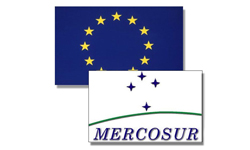 “A successful conclusion of an ambitious and comprehensive agreement between the EU and Mercosur represents a priority for BusinessEurope”, writes BusinessEurope Director General Markus J. Beyrer in a letter sent to EU Commissioners Cecilia Malmström and Phil Hogan as well as to the Estonian Presidency on 28 November. The EU-Mercosur negotiations are entering a crucial stage, and in the letter BusinessEurope calls on the European Institutions to cater for the overall EU economic benefit and consider the strategic benefits of a strong and forward-looking agreement with the four South American countries in the context of protectionist trends elsewhere in the world. On 28 November, BusinessEurope was also present at a high-level event organised by Apex-Brasil and the European Parliament. BusinessEurope stressed to the attending representatives from both the European Parliament and the Brazilian government that the outstanding issues in the negotiations are of key interest to European businesses. These include a modern approach to rules of origin, much expanded access to public procurement tenders for European companies at both federal and sub-federal levels, as well as strong provisions for protecting intellectual property rights. Such measures are, in addition to ongoing discussions of tariff eliminations, necessary for an FTA that opens up new opportunities for both European and Mercosur-based companies.
“A successful conclusion of an ambitious and comprehensive agreement between the EU and Mercosur represents a priority for BusinessEurope”, writes BusinessEurope Director General Markus J. Beyrer in a letter sent to EU Commissioners Cecilia Malmström and Phil Hogan as well as to the Estonian Presidency on 28 November. The EU-Mercosur negotiations are entering a crucial stage, and in the letter BusinessEurope calls on the European Institutions to cater for the overall EU economic benefit and consider the strategic benefits of a strong and forward-looking agreement with the four South American countries in the context of protectionist trends elsewhere in the world. On 28 November, BusinessEurope was also present at a high-level event organised by Apex-Brasil and the European Parliament. BusinessEurope stressed to the attending representatives from both the European Parliament and the Brazilian government that the outstanding issues in the negotiations are of key interest to European businesses. These include a modern approach to rules of origin, much expanded access to public procurement tenders for European companies at both federal and sub-federal levels, as well as strong provisions for protecting intellectual property rights. Such measures are, in addition to ongoing discussions of tariff eliminations, necessary for an FTA that opens up new opportunities for both European and Mercosur-based companies.
![]() Contact: Eleonora Catella
Contact: Eleonora Catella
Mind the impact of new capital requirements for non-performing loans
 BusinessEurope is concerned about the potential impact of the proposed Addendum to the European Central Bank Guidance to banks on non-performing loans, wrote BusinessEurope Director General Markus J. Beyrer to the Chair of the Supervisory Board of the Single Supervisory Mechanism, Danièle Nouy. It would lead to higher capital requirements than those set by EU law, further increasing financing problems. A comprehensive impact assessment of the proposed changes should be carried out before validating and finalising new rules to ensure that they function effectively, encourage growth and prevent damage to businesses in the wider economy.
BusinessEurope is concerned about the potential impact of the proposed Addendum to the European Central Bank Guidance to banks on non-performing loans, wrote BusinessEurope Director General Markus J. Beyrer to the Chair of the Supervisory Board of the Single Supervisory Mechanism, Danièle Nouy. It would lead to higher capital requirements than those set by EU law, further increasing financing problems. A comprehensive impact assessment of the proposed changes should be carried out before validating and finalising new rules to ensure that they function effectively, encourage growth and prevent damage to businesses in the wider economy.
![]() Contact: Erik M. Berggren
Contact: Erik M. Berggren
EU SME Assembly: Anna-Lena Bohm stresses the need for consistent regulations on digital
 “The current negotiations on the e-privacy regulation are shaping an instrument that will contradict the general data protection regulation”, said Anna-Lena Bohm, Chair of BusinessEurope’s ‘Entrepreneurship and SME’ Committee at the SME Envoys Network meeting chaired by European Commissioner Bienkowska in Tallinn on 23 November. “Having two regulations that are not well aligned will create huge compliance challenges for business”, she added. The meeting was part of the EU SME Assembly, the annual conference organised by the Commission and the EU Presidency for discussing the future direction of the EU SME policy (22-24 November 2017). Anna-Lena Bohm actively participated in the discussions.
“The current negotiations on the e-privacy regulation are shaping an instrument that will contradict the general data protection regulation”, said Anna-Lena Bohm, Chair of BusinessEurope’s ‘Entrepreneurship and SME’ Committee at the SME Envoys Network meeting chaired by European Commissioner Bienkowska in Tallinn on 23 November. “Having two regulations that are not well aligned will create huge compliance challenges for business”, she added. The meeting was part of the EU SME Assembly, the annual conference organised by the Commission and the EU Presidency for discussing the future direction of the EU SME policy (22-24 November 2017). Anna-Lena Bohm actively participated in the discussions.
![]() Contact: Daniel Cloquet
Contact: Daniel Cloquet
Who is liable in the Internet of Things?
 The Internet of Things (IoT) is one example of an expanding space where innovation is improving our economies and societies. Because of the fast pace of dissemination and novelty of its features, it is normal to ask questions around safety, liability or transparency. The current EU rules are fit to address liability issues in the field of IoT. Applicability of rules, such as the Product Liability Directive, to technologies that operate more as a service than ‘traditional’ products, might need some additional elaboration. But this is not a new issue and should continue to be addressed under the current framework. Creating a separate track of EU law would only bring legal uncertainty in the area of IoT devices which is just taking off. The multitude of actors in these IoT chains and different interactions between them is exactly why contractual terms are a preferred technique to assign the rights and responsibilities of the parties. These messages were voiced by Pedro Oliveira, BusinessEurope Director of Legal Affairs at the conference ‘Internet of Things – A Brave New World for Consumers’ organised by BEUC (European Consumer Organisation) on 28 November. Here our position paper on product liability.
The Internet of Things (IoT) is one example of an expanding space where innovation is improving our economies and societies. Because of the fast pace of dissemination and novelty of its features, it is normal to ask questions around safety, liability or transparency. The current EU rules are fit to address liability issues in the field of IoT. Applicability of rules, such as the Product Liability Directive, to technologies that operate more as a service than ‘traditional’ products, might need some additional elaboration. But this is not a new issue and should continue to be addressed under the current framework. Creating a separate track of EU law would only bring legal uncertainty in the area of IoT devices which is just taking off. The multitude of actors in these IoT chains and different interactions between them is exactly why contractual terms are a preferred technique to assign the rights and responsibilities of the parties. These messages were voiced by Pedro Oliveira, BusinessEurope Director of Legal Affairs at the conference ‘Internet of Things – A Brave New World for Consumers’ organised by BEUC (European Consumer Organisation) on 28 November. Here our position paper on product liability.
![]() Contact: Pedro Oliveira
Contact: Pedro Oliveira
Commission workshop on National Productivity Boards
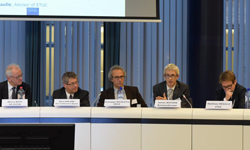 ‘National Productivity Boards can play an important role in building public support for productivity boosting policies’, was the key message of BusinessEurope Economics Director James Watson at a workshop on National Productivity Boards organised by the European Commission’s DG Ecfin on 21 November. The event was attended by members of National Productivity Boards, which Member States are recommended to set up (in many cases building on similar existing institutions) as part of the process of deepening EMU, as well as leading economists and representatives of Member States’ finance ministries. Watson outlined many of the key findings of our Annual Reform Barometer, notably the important role that investment in areas such as infrastructure, skills and innovation, the reform of product and labour markets, and the completion of the single market, can play in boosting long-term EU growth.
‘National Productivity Boards can play an important role in building public support for productivity boosting policies’, was the key message of BusinessEurope Economics Director James Watson at a workshop on National Productivity Boards organised by the European Commission’s DG Ecfin on 21 November. The event was attended by members of National Productivity Boards, which Member States are recommended to set up (in many cases building on similar existing institutions) as part of the process of deepening EMU, as well as leading economists and representatives of Member States’ finance ministries. Watson outlined many of the key findings of our Annual Reform Barometer, notably the important role that investment in areas such as infrastructure, skills and innovation, the reform of product and labour markets, and the completion of the single market, can play in boosting long-term EU growth.
![]() Contact: James Watson
Contact: James Watson
European business voices concerns over deteriorating investment conditions in China
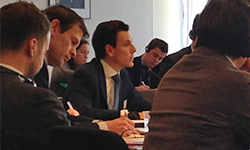 On 28 November, BusinessEurope took the floor during the 7th Industrial Policy Dialogue between the European Commission’s DG Grow and the Chinese Ministry of Industry and Information Technology. “Although China is an attractive market, European business needs long-term improvements in market access, a level playing field when operating in China, and a legal framework to make this happen”, said Maurice Fermont, Adviser in BusinessEurope International Relations Department. Despite China’s announcements to attract more foreign direct investment, year on year investment flows from Europe to China dropped by 23% to 8 billion euro in 2016. This comes at a time when over 50% of European companies present in China say they would increase their investments if they were given greater market access. “The swift conclusion of our Comprehensive Agreement on Investment as well as the implementation of China’s State Council Decisions 5 and 39 would provide this legal framework”, he concluded.
On 28 November, BusinessEurope took the floor during the 7th Industrial Policy Dialogue between the European Commission’s DG Grow and the Chinese Ministry of Industry and Information Technology. “Although China is an attractive market, European business needs long-term improvements in market access, a level playing field when operating in China, and a legal framework to make this happen”, said Maurice Fermont, Adviser in BusinessEurope International Relations Department. Despite China’s announcements to attract more foreign direct investment, year on year investment flows from Europe to China dropped by 23% to 8 billion euro in 2016. This comes at a time when over 50% of European companies present in China say they would increase their investments if they were given greater market access. “The swift conclusion of our Comprehensive Agreement on Investment as well as the implementation of China’s State Council Decisions 5 and 39 would provide this legal framework”, he concluded.
Contact: Maurice Fermont
Increasing European cybersecurity capacities
 As the global digital revolution takes hold and proliferates into our economies, societies and governments, the potential for information to be electronically tampered and controlled is real. Almost 90% of all data will require some level of security but by 2025 only half of it will fulfill such requirements. This poses a great threat to our citizens, businesses and political institutions. That is why, through its recently passed position paper, BusinessEurope supports the Commission’s intention to update ENISA’s mandate and set a framework to identify specific cybersecurity schemes that could meet pan European application. We aim to champion Europe’s cybersecurity capacities through innovative solutions while enabling a smooth transition to a fully digitalised economy.
As the global digital revolution takes hold and proliferates into our economies, societies and governments, the potential for information to be electronically tampered and controlled is real. Almost 90% of all data will require some level of security but by 2025 only half of it will fulfill such requirements. This poses a great threat to our citizens, businesses and political institutions. That is why, through its recently passed position paper, BusinessEurope supports the Commission’s intention to update ENISA’s mandate and set a framework to identify specific cybersecurity schemes that could meet pan European application. We aim to champion Europe’s cybersecurity capacities through innovative solutions while enabling a smooth transition to a fully digitalised economy.
![]() Contact: Patrick Grant
Contact: Patrick Grant
EU industrial strategy must go beyond the sum of actions in different policy areas
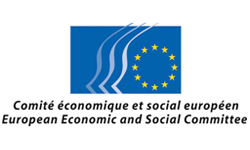 “A renewed industrial policy for Europe is back on the EU agenda and we welcome the Communication of the European Commission as a first step of the process. We now need a structured way forward, setting out a long-term vision for the future of our industry. We must ensure a well thought-through horizontal strategy – this must go beyond a sum of actions in different policy areas”. This was part of the message delivered by Joana Valente, Senior Adviser and Strategy Coordinator at BusinessEurope, at a hearing of the European Economic and Social Committee on the 27 November.
“A renewed industrial policy for Europe is back on the EU agenda and we welcome the Communication of the European Commission as a first step of the process. We now need a structured way forward, setting out a long-term vision for the future of our industry. We must ensure a well thought-through horizontal strategy – this must go beyond a sum of actions in different policy areas”. This was part of the message delivered by Joana Valente, Senior Adviser and Strategy Coordinator at BusinessEurope, at a hearing of the European Economic and Social Committee on the 27 November.
Contact: Joana Valente
Unleashing Europe’s data economy
 BusinessEurope recently published a position paper to support the European Commission’s intention to remove localisation requirements as fast as possible unless specific public security concerns exist with the aim of facilitating the free flow of data as a common European principle. Building a data economy that is fit for the global digital age is one of the greatest challenges for Europe’s digital single market. Not only does our growth, jobs and competitiveness rely upon it, but as data has become a vital resource, its power will enable key technologies to function that will provide vast benefits to our economies and societies. Yet national localisation requirements that are passed at Member State level are forcing data to remain geographically located. This is fragmenting our digital single market. Europe’s data economy could be worth more than 106 billion EUR by 2020 if the right conditions are set. This would also bring vast societal improvements for citizens through better management of healthcare, education, transport and scare resources.
BusinessEurope recently published a position paper to support the European Commission’s intention to remove localisation requirements as fast as possible unless specific public security concerns exist with the aim of facilitating the free flow of data as a common European principle. Building a data economy that is fit for the global digital age is one of the greatest challenges for Europe’s digital single market. Not only does our growth, jobs and competitiveness rely upon it, but as data has become a vital resource, its power will enable key technologies to function that will provide vast benefits to our economies and societies. Yet national localisation requirements that are passed at Member State level are forcing data to remain geographically located. This is fragmenting our digital single market. Europe’s data economy could be worth more than 106 billion EUR by 2020 if the right conditions are set. This would also bring vast societal improvements for citizens through better management of healthcare, education, transport and scare resources.
![]() Contact: Patrick Grant
Contact: Patrick Grant
The role of trade policy in development and migration
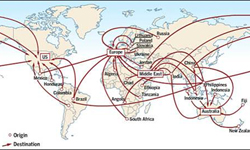 BusinessEurope took part in an expert workshop on European trade policy and migration organised on 28 November by the German Institute for International and Security Affairs – Stiftung Wissenschaft und Politik (SWP). BusinessEurope believes trade and investments contribute to job creation, growth, development, stability and thus improve the perspectives for people living in partner countries and diminish incentives to migrate. “While the EU is gradually moving away from a donor-recipient model and is increasing acknowledging that development aid alone cannot provide long-term solutions, the private sector is ready to play its role”, said Senior Adviser Eleonora Catella.
BusinessEurope took part in an expert workshop on European trade policy and migration organised on 28 November by the German Institute for International and Security Affairs – Stiftung Wissenschaft und Politik (SWP). BusinessEurope believes trade and investments contribute to job creation, growth, development, stability and thus improve the perspectives for people living in partner countries and diminish incentives to migrate. “While the EU is gradually moving away from a donor-recipient model and is increasing acknowledging that development aid alone cannot provide long-term solutions, the private sector is ready to play its role”, said Senior Adviser Eleonora Catella.
Contact: Eleonora Catella
Improving vocational education & training is essential for meeting future skills challenges
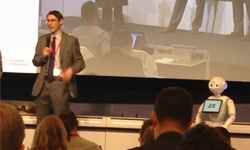 Quality and effectiveness are the main components of well-functioning vocational education and training (VET) systems. Improving at the same time quality and effectiveness is essential to make investments in VET more attractive for companies, and to make more young people select this training pathway. Two important variables are the labour market relevance of learning outcomes, which is the key factor of employability, and a clear division of responsibilities between relevant stakeholders as part of a cooperative governance. These were the key message given by Robert Plummer, BusinessEurope Senior Adviser, at the closing ceremony of the second European Vocational Skills Week, which took place on 24 November in Brussels. Delivering quality and effective VET will be key in meeting some of the main challenges that Europe’s labour markets and societies are facing, namely digitisation, demographic change and the greening of our economies.
Quality and effectiveness are the main components of well-functioning vocational education and training (VET) systems. Improving at the same time quality and effectiveness is essential to make investments in VET more attractive for companies, and to make more young people select this training pathway. Two important variables are the labour market relevance of learning outcomes, which is the key factor of employability, and a clear division of responsibilities between relevant stakeholders as part of a cooperative governance. These were the key message given by Robert Plummer, BusinessEurope Senior Adviser, at the closing ceremony of the second European Vocational Skills Week, which took place on 24 November in Brussels. Delivering quality and effective VET will be key in meeting some of the main challenges that Europe’s labour markets and societies are facing, namely digitisation, demographic change and the greening of our economies.
Contact: Robert Plummer
How to put the GDPR into practice?
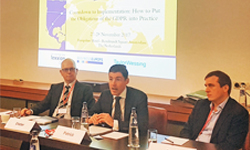 BusinessEurope spoke at a seminar on Tuesday 28 November on the implementation of the General Data Protection Regulation (GDPR). This event brought together regulators, stakeholders and academia from all over Europe to discuss ongoing challenges and prepare for full GDPR application. Adviser, Patrick Grant, summarised that businesses are committed to complying with the GDPR but that many practical questions remained. The GDPR itself left many provisions open for national policy makers and regulators to determine in practice. It is this moving target that businesses are concerned about. He also raised that while ongoing Working Party 29 Guidance is necessary it has often gone further than the final text of the GDPR. Stakeholders and regulators agreed that trust needs to be forged between both parties through transparency in the Working Party 29 process in order to make a success of GDPR transformation for Europe.
BusinessEurope spoke at a seminar on Tuesday 28 November on the implementation of the General Data Protection Regulation (GDPR). This event brought together regulators, stakeholders and academia from all over Europe to discuss ongoing challenges and prepare for full GDPR application. Adviser, Patrick Grant, summarised that businesses are committed to complying with the GDPR but that many practical questions remained. The GDPR itself left many provisions open for national policy makers and regulators to determine in practice. It is this moving target that businesses are concerned about. He also raised that while ongoing Working Party 29 Guidance is necessary it has often gone further than the final text of the GDPR. Stakeholders and regulators agreed that trust needs to be forged between both parties through transparency in the Working Party 29 process in order to make a success of GDPR transformation for Europe.
Contact: Patrick Grant
Business committed to healthy workplaces for all ages
 BusinessEurope showed its commitment as official partner to the EU Health and Safety Agency’s campaign on healthy workplaces for all ages at its closing event in Bilbao on 22 November. “We need to look at what people are able to do at work, rather than what they are not able to do”, said Kris de Meester, Chair of BusinessEurope’s Health and Safety Working Group. BusinessEurope organised its own event on the margins of the conference to highlight different employer approaches to improving health and safety at the workplace towards longer working lives. The key message was that good health and safety is important to make longer working lives a reality, but only in a broader context where motivation, job content and working relationships are also important.
BusinessEurope showed its commitment as official partner to the EU Health and Safety Agency’s campaign on healthy workplaces for all ages at its closing event in Bilbao on 22 November. “We need to look at what people are able to do at work, rather than what they are not able to do”, said Kris de Meester, Chair of BusinessEurope’s Health and Safety Working Group. BusinessEurope organised its own event on the margins of the conference to highlight different employer approaches to improving health and safety at the workplace towards longer working lives. The key message was that good health and safety is important to make longer working lives a reality, but only in a broader context where motivation, job content and working relationships are also important.
Contact: Rebekah Smith
European Innovation Council to reinforce, rather than replace support to industrial innovation
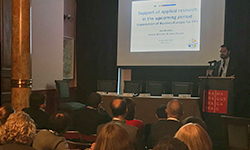 To overcome the innovation deficit and make better use of excellent research, the EU needs to strengthen its innovation value chains and enhance support to close-to-market activities. “The new European Innovation Council (EIC) shall contribute to both disruptive and incremental innovation to maintain Europe’s industrial leadership”, said BusinessEurope Senior Adviser Jan Bambas at TAFTIE Policy Forum on 22 November. The event, organised in Brussels by the Technology Agency of the Czech Republic, gathered experts from member states as well as EU institutions to discuss the next EU Framework Programme and the EIC in particular. Jan Bambas stressed that “the EU needs to make better economic use of its excellent research, requiring better-targeted support to wide range of industrial activities. Hence, the Commission needs to ensure that the EIC, piloted by the Commission in Horizon 2020, shall not create extra layer of governance and replace support to other significant activities, notably support to key enabling technologies.”
To overcome the innovation deficit and make better use of excellent research, the EU needs to strengthen its innovation value chains and enhance support to close-to-market activities. “The new European Innovation Council (EIC) shall contribute to both disruptive and incremental innovation to maintain Europe’s industrial leadership”, said BusinessEurope Senior Adviser Jan Bambas at TAFTIE Policy Forum on 22 November. The event, organised in Brussels by the Technology Agency of the Czech Republic, gathered experts from member states as well as EU institutions to discuss the next EU Framework Programme and the EIC in particular. Jan Bambas stressed that “the EU needs to make better economic use of its excellent research, requiring better-targeted support to wide range of industrial activities. Hence, the Commission needs to ensure that the EIC, piloted by the Commission in Horizon 2020, shall not create extra layer of governance and replace support to other significant activities, notably support to key enabling technologies.”
Contact: Jan Bambas
Calendar 
- 4-5 December: Eurogroup and Economic and Financial Affairs Council
- 4 December: Transport, Telecommunications and Energy Council
- 6 December: Economic and Monetary Union (EMU) reform package
- 7-8 December: Intellectual Property Summit
- 10-13 December: WTO 11th Ministerial Conference